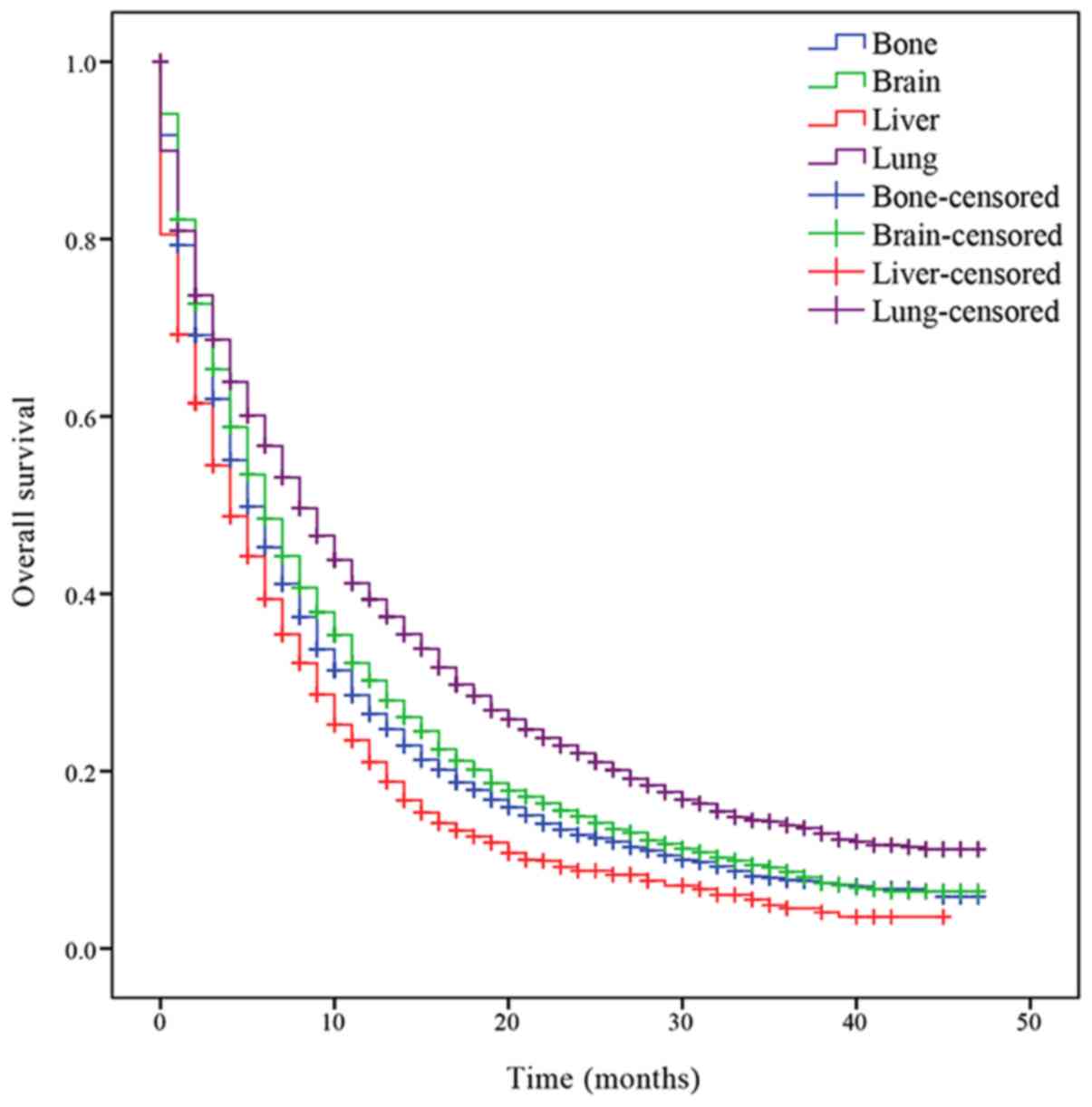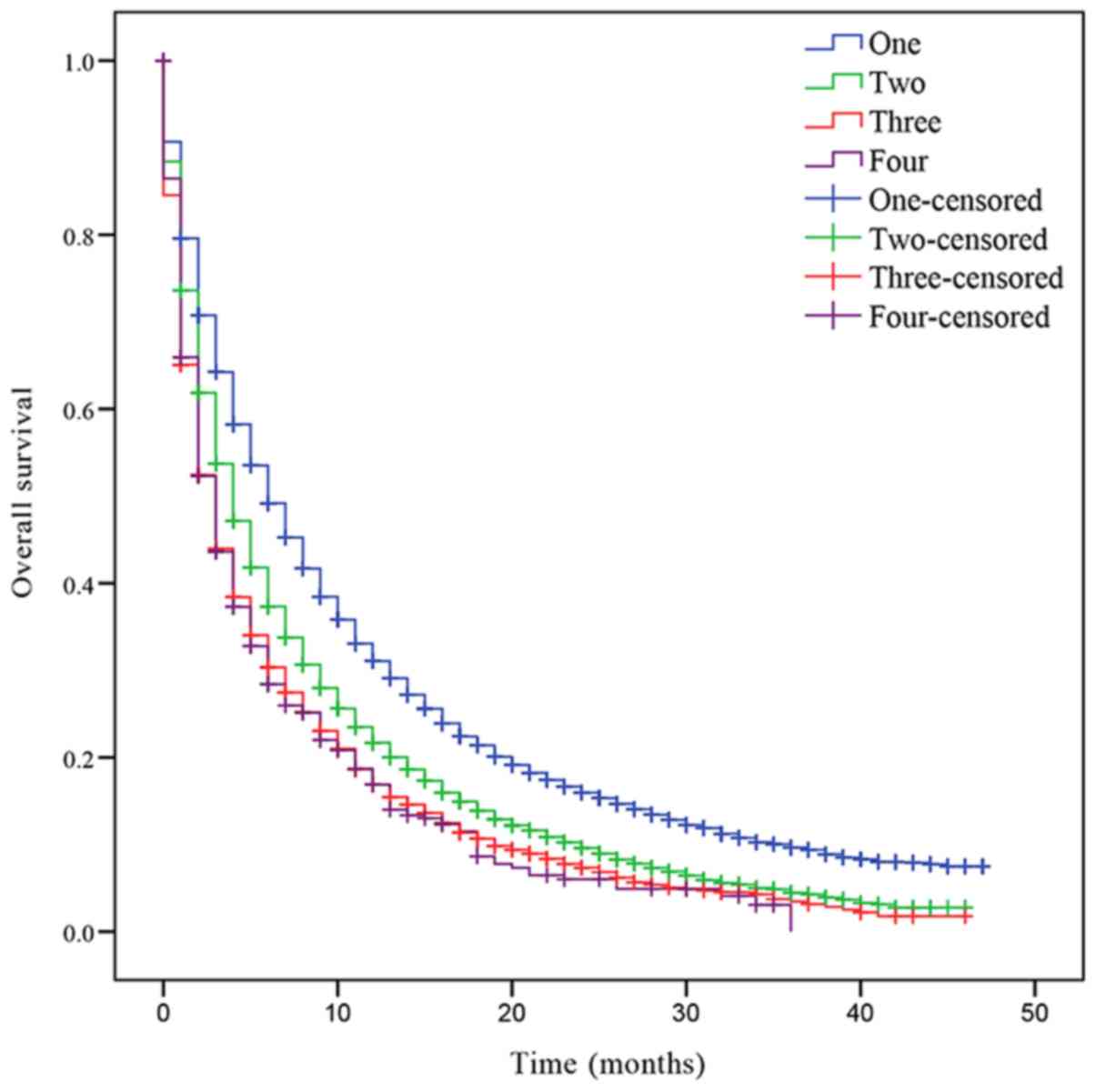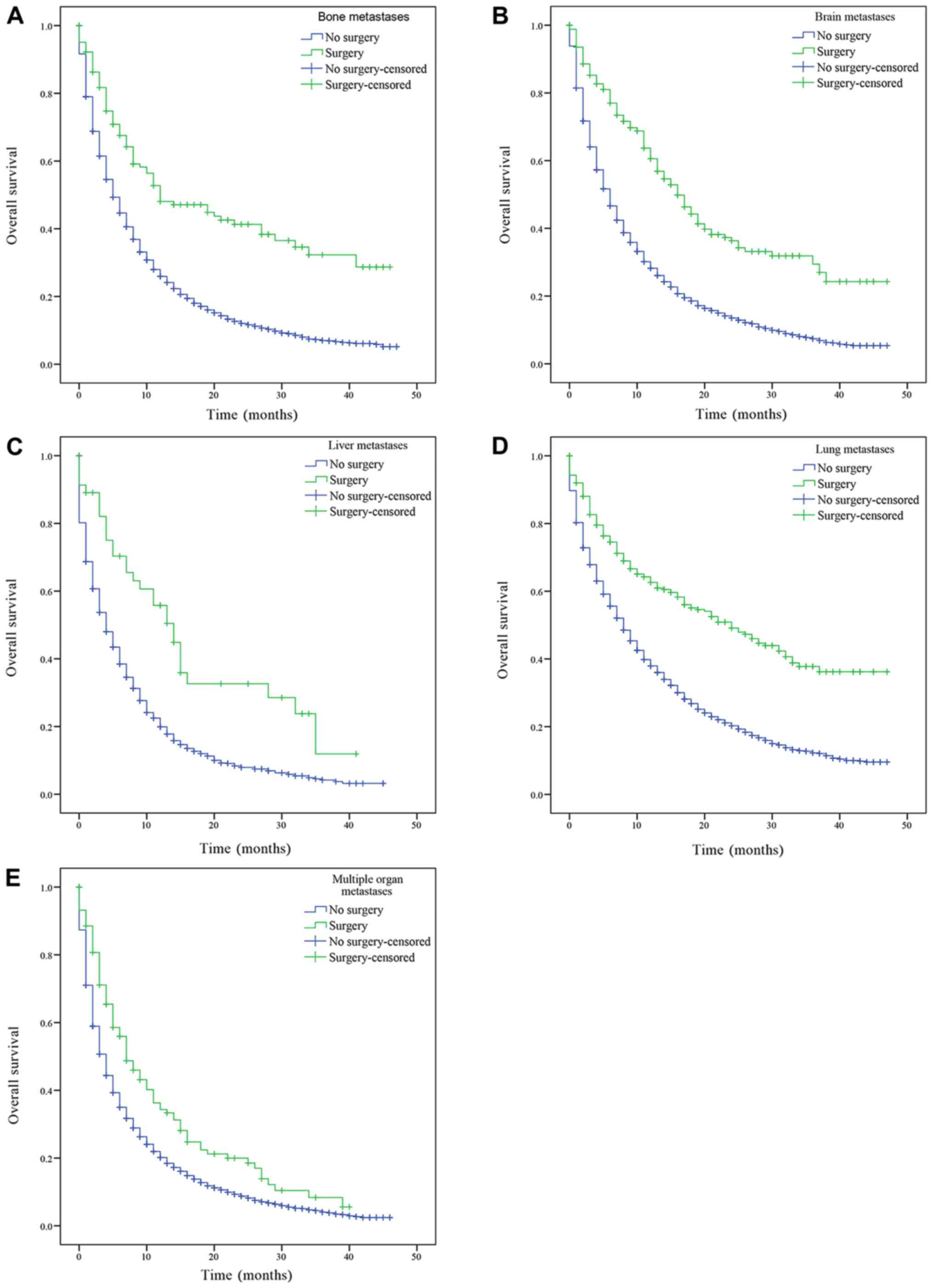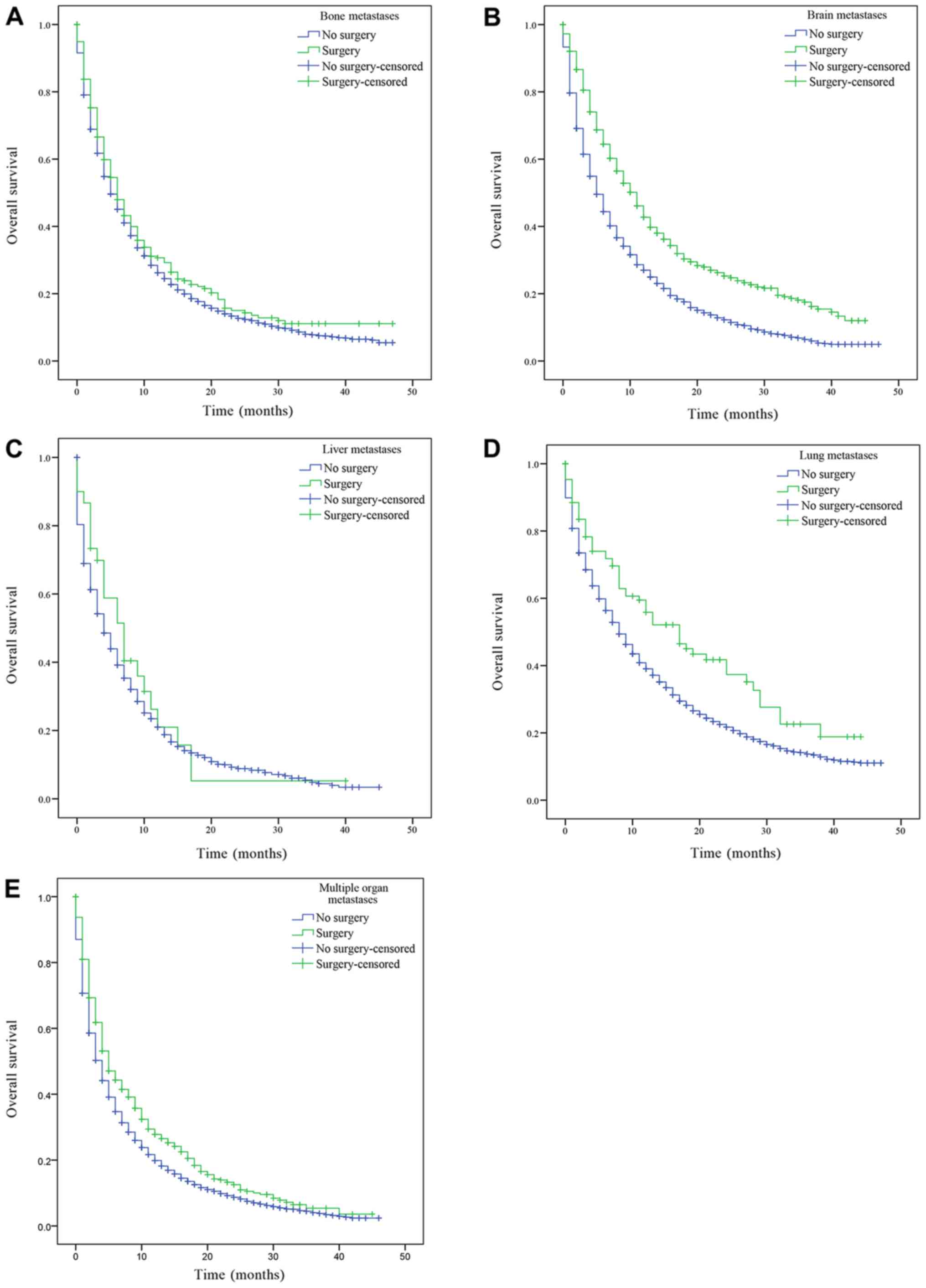|
1
|
Bray F, Ferlay J, Soerjomataram I, Siegel
RL, Torre LA and Jemal A: Global cancer statistics 2018: GLOBOCAN
estimates of incidence and mortality worldwide for 36 cancers in
185 countries. CA Cancer J Clin. 68:394–424. 2018. View Article : Google Scholar : PubMed/NCBI
|
|
2
|
Siegel RL, Miller KD and Jemal A: Cancer
statistics, 2018. CA Cancer J Clin. 68:7–30. 2018. View Article : Google Scholar : PubMed/NCBI
|
|
3
|
Noone AM, Howlader N, Krapcho M, Miller D,
Brest A, Yu M, Ruhl J, Tatalovich Z, Mariotto A, Lewis DR, et al:
SEER Cancer Statistics Review, 1975–2015, National Cancer
Institute. Bethesda, MD: 2018, https://seer.cancer.gov/archive/csr/1975_2015/September
10–2018
|
|
4
|
Duan L, Pang HL, Chen WJ, Shen WW, Cao PP,
Wang SM, Liu LL and Zhang HL: The role of GDF15 in bone metastasis
of lung adenocarcinoma cells. Oncol Rep. 41:2379–2388.
2019.PubMed/NCBI
|
|
5
|
Riihimäki M, Hemminki A, Fallah M, Thomsen
H, Sundquist K, Sundquist J and Hemminki K: Metastatic sites and
survival in lung cancer. Lung Cancer. 86:78–84. 2014. View Article : Google Scholar : PubMed/NCBI
|
|
6
|
Wang Y, Xie S and He B: Effect of EGFR
gene polymorphism on efficacy of chemotherapy combined with
targeted therapy for non-small cell lung cancer in Chinese
patients. Am J Cancer Res. 9:619–627. 2019.PubMed/NCBI
|
|
7
|
Sosa Iglesias V, Giuranno L, Dubois LJ,
Theys J and Vooijs M: Drug resistance in non-small cell lung
cancer: A potential for NOTCH Targeting? Front Oncol. 8:2672018.
View Article : Google Scholar : PubMed/NCBI
|
|
8
|
Kogure Y: Cost effectiveness and health
economics of immune checkpoint inhibitors for non-small cell lung
cancer. Gan To Kagaku Ryoho. 45:781–784. 2018.(In Japanese).
PubMed/NCBI
|
|
9
|
Skinner KE, Fernandes AW, Walker MS
Pavilack M and VanderWalde A: Healthcare costs in patients with
advanced non-small cell lung cancer and disease progression during
targeted therapy: A real-world observational study. J Med Econ.
21:192–200. 2018. View Article : Google Scholar : PubMed/NCBI
|
|
10
|
Furák J, Troján I, Szöke T, Agócs L,
Csekeö A, Kas J, Svastics E, Eller J and Tiszlavicz L: Lung cancer
and its operable brain metastasis: Survival rate and staging
problems. Ann Thorac Surg. 79:241–247. 2005. View Article : Google Scholar : PubMed/NCBI
|
|
11
|
Hanagiri T, Takenaka M, Oka S, Shigematsu
Y, Nagata Y, Shimokawa H, Uramoto H and Tanaka F: Results of a
surgical resection for patients with stage IV non-small-cell lung
cancer. Clin Lung Cancer. 13:220–224. 2012. View Article : Google Scholar : PubMed/NCBI
|
|
12
|
Congedo MT, Cesario A, Lococo F, De Waure
C, Apolone G, Meacci E, Cavuto S and Granone P: Surgery for
oligometastatic non-small cell lung cancer: Long-term results from
a single center experience. J Thorac Cardiovasc Surg. 144:444–452.
2012. View Article : Google Scholar : PubMed/NCBI
|
|
13
|
Tieqin L, Hongxu L, Yu L, Shun X and
Chunlu Y: Influencing factors of survival rate on 44 cases of
postoperative stage IV non-small-celllung cancer. Chin J Ciinicians
(Eiectronic Ed). 7:605–608. 2013.
|
|
14
|
Edge SB, Byrd DR, Compton CC, Fritz AG,
Greene FL and Trotti A: AJCC Cancer Staging Manual. (7th).
Springer. (New York, NY). 2009.
|
|
15
|
Delea T, Langer C, McKiernan J, Liss M,
Edelsberg J, Brandman J, Sung J, Raut M and Oster G: The cost of
treatment of skeletal-related events in patients with bone
metastases from lung cancer. Oncology. 67:390–396. 2004. View Article : Google Scholar : PubMed/NCBI
|
|
16
|
Hofferberth SC, Grinstaff MW and Colson
YL: Nanotechnology applications in thoracic surgery. Eur J
Cardiothorac Surg. 50:6–16. 2016. View Article : Google Scholar : PubMed/NCBI
|
|
17
|
Vaughn C, Mychaskiw G II and Sewell P:
Massive hemorrhage during radiofrequency ablation of a pulmonary
neoplasm. Anesth Analg. 94:1149–1151. 2002. View Article : Google Scholar : PubMed/NCBI
|
|
18
|
Tutar N, Yurci A, Güneş I, Gülmez İ,
Gürsoy Ş, Önal Ö and Canöz Ö: The role of endobronchial and
endoscopic ultrasound guided fine needle aspiration for mediastinal
nodal staging of non-small-cell lung cancer. Tuberk Toraks.
66:85–92. 2018. View
Article : Google Scholar : PubMed/NCBI
|
|
19
|
Reck M and Rabe KF: Precision diagnosis
and treatment for advanced non-small-cell lung cancer. N Engl J
Med. 377:849–861. 2017. View Article : Google Scholar : PubMed/NCBI
|
|
20
|
Dong F, Shen Y, Gao F, Xu T, Wang X, Zhang
X, Zhong S, Zhang M, Chen S and Shen Z: Prognostic value of
site-specific metastases and therapeutic roles of surgery for
patients with metastatic bladder cancer: A population-based study.
Cancer Manag Res. 9:611–626. 2017. View Article : Google Scholar : PubMed/NCBI
|
|
21
|
Luo D, Liu Q, Yu W, Ma Y, Zhu J, Lian P,
Cai S, Li Q and Li X: Prognostic value of distant metastasis sites
and surgery in stage IV colorectal cancer: A population-based
study. Int J Colorectal Dis. 33:1241–1249. 2018. View Article : Google Scholar : PubMed/NCBI
|
|
22
|
Tamura T, Kurishima K, Nakazawa K,
Kagohashi K, Ishikawa H, Satoh H and Hizawa N: Specific organ
metastases and survival in metastatic non-small-cell lung cancer.
Mol Clin Oncol. 3:217–221. 2015. View Article : Google Scholar : PubMed/NCBI
|
|
23
|
Nakazawa K, Kurishima K, Tamura T,
Kagohashi K, Ishikawa H, Satoh H and Hizawa N: Specific organ
metastases and survival in small cell lung cancer. Oncol Lett.
4:617–620. 2012. View Article : Google Scholar : PubMed/NCBI
|
|
24
|
Yang J, Zhang Y, Sun X, Gusdon AM, Song N,
Chen L, Jiang G and Huang Y: The prognostic value of multiorgan
metastases in patients with non-small cell lung cancer and its
variants: A SEER-based study. J Cancer Res Clin Oncol.
144:1835–1842. 2018. View Article : Google Scholar : PubMed/NCBI
|
|
25
|
Gibson AJW, Li H, D'Silva A, Tudor RA,
Elegbede AA, Otsuka SM, Bebb DG and Cheung WY: Impact of number
versus location of metastases on survival in stage IV M1b non-small
cell lung cancer. Med Oncol. 35:1172018. View Article : Google Scholar : PubMed/NCBI
|
|
26
|
Rami-Porta R, Bolejack V, Crowley J, Ball
D, Kim J, Lyons G, Rice T, Suzuki K, Thomas CF Jr, Travis WD, et
al: The IASLC lung cancer staging project: Proposals for the
revisions of the T descriptors in the forthcoming eighth edition of
the TNM classification for lung cancer. J Thorac Oncol.
10:990–1003. 2015. View Article : Google Scholar : PubMed/NCBI
|
|
27
|
Oweira H, Petrausch U, Helbling D, Schmidt
J, Mannhart M, Mehrabi A, Schöb O, Giryes A, Decker M and
Abdel-Rahman O: Prognostic value of site-specific metastases in
pancreatic adenocarcinoma: A Surveillance Epidemiology and End
Results database analysis. World J Gastroenterol. 23:1872–1880.
2017. View Article : Google Scholar : PubMed/NCBI
|
|
28
|
Hidalgo M: Pancreatic cancer. N Engl J
Med. 362:1605–1617. 2010. View Article : Google Scholar : PubMed/NCBI
|
|
29
|
Shi Y, Sun Y, Yu J, Ding C, Wang Z, Wang
C, Wang D, Wang C, Wang Z, Wang M, et al: China experts consensus
on the diagnosis and treatment of advanced stage primary lung
cancer (2016 version). Asia Pac J Clin Oncol. 13:87–103. 2017.
View Article : Google Scholar : PubMed/NCBI
|
|
30
|
Shi Y, Sun Y, Yu J, Ding C, Ma Z, Wang Z,
Wang D, Wang Z, Wang M, Wang Y, et al: China experts consensus on
the diagnosis and treatment of brain metastases of lung cancer
(2017 version). Zhongguo Fei Ai Za Zhi. 20:1–13. 2017.(In Chinese).
PubMed/NCBI
|
|
31
|
Sun Y, Guan Z, Liao M, Yu X, Wang C, Wang
J, Niu X, Shi Y, Zhi X, Liu Y, et al: Expert consensus on the
diagnosis and treatment of bone metastasis in lung cancer (2014
version). Zhongguo Fei Ai Za Zhi. 17:57–72. 2014.(In Chinese).
PubMed/NCBI
|
|
32
|
Schmelzle M, Eisenberger CF, Am Esch JS
II, Matthaei H, Krausch M and Knoefel WT: Non-colorectal,
non-neuroendocrine, and non-sarcoma metastases of the liver:
Resection as a promising tool in the palliative management.
Langenbecks Arch Surg. 395:227–234. 2010. View Article : Google Scholar : PubMed/NCBI
|
|
33
|
Ileana E, Greillier L, Moutardier V and
Barlesi F: Surgical resection of liver non-small cell lung cancer
metastasis: A dual weapon? Lung Cancer. 70:221–222. 2010.
View Article : Google Scholar : PubMed/NCBI
|
|
34
|
Di Carlo I, Grasso G, Patane' D, Russello
D and Latteri F: Liver metastases from lung cancer: Is surgical
resection justified? Ann Thorac Surg. 76:291–293. 2003. View Article : Google Scholar : PubMed/NCBI
|
|
35
|
Reddy SK, Barbas AS, Marroquin CE, Morse
MA, Kuo PC and Clary BM: Resection of noncolorectal
nonneuroendocrine liver metastases: A comparative analysis. J Am
Coll Surg. 204:372–382. 2007. View Article : Google Scholar : PubMed/NCBI
|
|
36
|
Abdel-Rahman O: Outcomes of surgery as
part of the management of metastatic Non-small-cell lung cancer: A
Surveillance, epidemiology and End results database analysis.
Cancer Invest. 36:238–245. 2018. View Article : Google Scholar : PubMed/NCBI
|
|
37
|
Liu K, Zheng D, Xu G, Du Z and Wu S: Local
thoracic therapy improve prognosis for stage IV non-small cell lung
cancer patients combined with chemotherapy: A Surveillance,
Epidemiology, and End results database analysis. PLoS One.
12:e01873502017. View Article : Google Scholar : PubMed/NCBI
|
|
38
|
Setzer M, Robinson LA and Vrionis FD:
Management of locally advanced pancoast (superior sulcus) tumors
with spine involvement. Cancer Control. 21:158–167. 2014.
View Article : Google Scholar : PubMed/NCBI
|
|
39
|
Rui M, Pengqing Y and Chang C: Progress in
resection and reconstruction of chest wall in non-small lung
cancer. Chin J Clin Thorac Cardiovasc Surg. 22:685–690. 2015.
|
|
40
|
Dai C, Shen J, Ren Y, Zhong S, Zheng H, He
J, Xie D, Fei K, Liang W, Jiang G, et al: Choice of surgical
procedure for patients with Non-small-cell lung cancer ≤1 cm or
>1 to 2 cm among lobectomy, segmentectomy, and wedge resection:
A population-based study. J Clin Oncol. 34:3175–3182. 2016.
View Article : Google Scholar : PubMed/NCBI
|
|
41
|
Ludwig MS, Goodman M, Miller DL and
Johnstone PA: Postoperative survival and the number of lymph nodes
sampled during resection of node-negative non-small cell lung
cancer. Chest. 128:1545–1550. 2005. View Article : Google Scholar : PubMed/NCBI
|
|
42
|
Zhang R, Li P, Li Q, Qiao Y, Xu T, Ruan P,
Song Q and Fu Z: Radiotherapy improves the survival of patients
with stage IV NSCLC: A propensity score matched analysis of the
SEER database. Cancer Med. 7:5015–5026. 2018. View Article : Google Scholar : PubMed/NCBI
|
|
43
|
Herskovic A, Chitti B, Christos P,
Wernicke AG and Parashar B: Addition of surgery after radiation
significantly improves survival in stage IIIB Non-small cell lung
cancer: A population-based analysis. World J Surg. 41:758–762.
2017. View Article : Google Scholar : PubMed/NCBI
|
|
44
|
Verma V, Rwigema JM, Adeberg S and Simone
CB II: Enrollment of elderly patients with locally advanced
non-small cell lung cancer in multi-institutional trials of proton
beam radiation therapy. Clin Lung Cancer. 18:441–443. 2017.
View Article : Google Scholar : PubMed/NCBI
|
|
45
|
He M, Li S, Chen Y, Ouyang M, Chen P and
Zhang J: 131I-chTNT injection to relieve tracheal obstruction in
advanced NSCLC patient. Technol Health Care. 24 (Suppl
2):S513–S519. 2016. View Article : Google Scholar : PubMed/NCBI
|
|
46
|
Hendriks LE, Hermans BC, van den
Beuken-van Everdingen MH, Hochstenbag MM and Dingemans AM: Effect
of Bisphosphonates, Denosumab, and radioisotopes on bone pain and
quality of life in patients with non-small cell lung cancer and
bone metastases: A systematic review. J Thorac Oncol. 11:155–173.
2016. View Article : Google Scholar : PubMed/NCBI
|
|
47
|
Toffart AC, Duruisseaux M, Brichon PY,
Pirvu A, Villa J, Selek L, Guillem P, Dumas I, Ferrer L, Levra MG
and Moro-Sibilot D: Operation and chemotherapy: Prognostic factors
for lung cancer with one synchronous metastasis. Ann Thorac Surg.
105:957–965. 2018. View Article : Google Scholar : PubMed/NCBI
|
|
48
|
Cheng TD, Darke AK, Redman MW, Zirpoli GR,
Davis W, Payne Ondracek R, Bshara W, Omilian AR, Kratzke R, Reid
ME, et al: Smoking, Sex, and Non-small cell lung cancer: Steroid
hormone receptors in tumor tissue (S0424). J Natl Cancer Inst.
110:734–742. 2018. View Article : Google Scholar : PubMed/NCBI
|
|
49
|
Merrill RM and Johnson E: Benefits of
marriage on relative and conditional relative cancer survival
differ between males and females in the USA. J Cancer Surviv.
11:578–589. 2017. View Article : Google Scholar : PubMed/NCBI
|
|
50
|
Wu Y, Ai Z and Xu G: Marital status and
survival in patients with non-small cell lung cancer: An analysis
of 70006 patients in the SEER database. Oncotarget.
8:103518–103534. 2017.PubMed/NCBI
|
|
51
|
Richards TB, Henley SJ, Puckett MC, Weir
HK, Huang B, Tucker TC and Allemani C: Lung cancer survival in the
United States by race and stage (2001–2009): Findings from the
CONCORD-2 study. Cancer. 123:5079–5099. 2017. View Article : Google Scholar : PubMed/NCBI
|
|
52
|
Williams CD, Salama JK, Moghanaki D, Karas
TZ and Kelley MJ: Impact of race on treatment and survival among
U.S. Veterans with early-stage lung cancer. J Thorac Oncol.
11:1672–1681. 2016. View Article : Google Scholar : PubMed/NCBI
|
|
53
|
Videtic GM, Reddy CA, Chao ST, Rice TW,
Adelstein DJ, Barnett GH, Mekhail TM, Vogelbaum MA and Suh JH:
Gender, race, and survival: A study in non-small-cell lung cancer
brain metastases patients utilizing the radiation therapy oncology
group recursive partitioning analysis classification. Int J Radiat
Oncol Biol Phys. 75:1141–1147. 2009. View Article : Google Scholar : PubMed/NCBI
|
|
54
|
Tannenbaum SL, Koru-Sengul T, Zhao W, Miao
F and Byrne MM: Survival disparities in non-small cell lung cancer
by race, ethnicity, and socioeconomic status. Cancer J. 20:237–245.
2014. View Article : Google Scholar : PubMed/NCBI
|
|
55
|
Yoshinaga Y, Enatsu S, Iwasaki A and
Shirakusa T: Surgical treatment for primary non-small cell lung
cancer with synchronous brain metastases. Kyobu Geka. 59:41–45.
2016.(In Japanese).
|
|
56
|
Ramalingam S, Dinan MA and Crawford J:
Survival comparison in patients with Stage IV lung cancer in
Academic versus Community centers in the United States. J Thorac
Oncol. 13:1842–1850. 2018. View Article : Google Scholar : PubMed/NCBI
|
|
57
|
Xiaolan J and Jia W: Prognostic factors
for bone metastasis of patients with non-small-cell lung cancer.
Shandong Med. 56:88–90. 2016.
|
|
58
|
Masters GA, Temin S, Azzoli CG, Giaccone
G, Baker S Jr, Brahmer JR, Ellis PM, Gajra A, Rackear N, Schiller
JH, et al: Systemic therapy for stage IV non-small-cell lung
cancer: American Society of Clinical Oncology Clinical Practice
Guideline Update. J Clin Oncol. 33:3488–3515. 2015. View Article : Google Scholar : PubMed/NCBI
|
|
59
|
Zhang YL, Yuan JQ, Wang KF, Fu XH, Han XR,
Threapleton D, Yang ZY, Mao C and Tang JL: The prevalence of EGFR
mutation in patients with non-small cell lung cancer: A systematic
review and meta-analysis. Oncotarget. 7:78985–78993.
2016.PubMed/NCBI
|


















